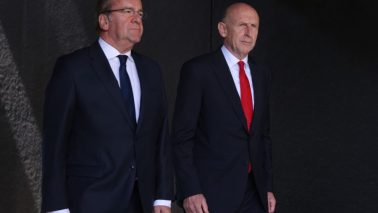To mark Holocaust Memorial Day, here’s a piece Sam Schulman wrote for The Spectator 12 years ago, on his fear that ‘Holocaustology’ will create a new form of anti-Semitism.
Did six million die for this?, Sam Schulman, 1 January 2000
The Holocaust dominated the moral imagination of the 20th century. Before the rise of Hitler, anti-Semitism was a parochial concern of the Jews; after the war it was everyone’s concern, and everyone regarded it with horror.
The cause of anti-Semitism is a mystery to most Jews and most Gentiles, but it was not a mystery to Isaiah Berlin. He blamed it on the New Testament. That is true of one kind of anti-Semitism, based on history and doctrinal differences. Another kind is more subtle and only a century or two old. Rebecca West discovered it during her travels through prewar Yugoslavia: ‘Now I understand some other cause for anti-Semitism; many primitive peoples must receive their first indication of the toxic quality of thought from Jews. They know only the fortifying idea of religion; they see in Jews the effect of the tormenting and disintegrating ideas of scepticism.’ This feeling is shared by those who saw the Jews behind such forces as Bolshevism and ‘progressive’ movements of all kinds: a supposed Jewish ‘weakness for communism’ was observed by such genial anti-Semites as Gregor von Rezzori, villains like Hitler, and, in an interesting new book on the Vietnam war, by the wellliked young American liberal Michael Lind.
But a new kind of anti-Semitism may emerge in the 21st century, in reaction to the attempt to make ‘the Holocaust’ central to our civilisation. The proliferation of Holocaust memorials and museums, and the emergence of a new academic discipline called Holocaust and Genocide Studies, threaten to undermine a proper understanding of the Nazi war against the Jews. More disturbingly, however, it is igniting resentment against what is seen as moral and political posturing on the part of some Jews.
The National Holocaust Memorial Museum in Washington, DC, is the perfect example of what happens when the attempt to understand the Holocaust breaks free from historical discipline and is raised in a hothouse of preening, modish concern; when it becomes ‘Holocaustology’. The museum’s director of education, Joan Ringelheim, has been attacked by Gabriel Schoenfeld in the magazine Commentary for drawing a connection between Nazi ‘sexism’ and the age-old ‘exploitation’ of Jewish women by Jewish men. ‘In this very link,’ writes Mr Schoenfeld, ‘Ringelheim has located a key to the puzzle of why “malestream” scholarship has allegedly erased the history of women in the Holocaust. After all, she writes, many people today simply find it “too difficult to contemplate the extent to which … the sexism of Nazi ideology and the sexism of the Jewish community met in a tragic and involuntary alliance”.’
In the world of Ms Ringelheim the Holocaust becomes a means to other ends. It is important for Holocaustology to show, for example, that the Nazis were sexists as well as butchers; that the extermination of the Jews has to be put in historical context with other persecutions; that persons of colour and members of the working class lived in Auschwitz-like conditions before and after the historical Holocaust. More recently, another feminist scholar has reexamined Anne Frank’s diaries and discovered that, had Ms Frank escaped the crematorium, she might well, with luck, have become a lesbian.
In America, in one ‘mission statement’ after another, universities advertise their Holocaust and Genocide Studies programmes as specific remedies for Holocaust relapse. The University of Minnesota declares that the basic purpose of Holocaust studies is ‘to educate people to be sensitive and vigilant toward behaviour with potential for a Holocaust’ (as if genocides lurked around unlit alleys in downtown St Paul). A Minnesota instructor, Lucy Smith, is actively opposed to the role of history in this enterprise. She wonders, rather unfairly I think, whether ‘teaching about, for example, the Night of St Bartolomy in France ever prevented any other genocide. If our purpose in teaching is to prevent such occurrences, then we need to reach the emotions of the students before teaching them historical facts.’ As a way, perhaps, of reaching emotions before worrying about facts, the website of the Minnesota programme offers electronic buttons to press for ‘educational resources’, ‘visual resources’ and the like, in the shape of little ovens built into a brick chimney, which light up after you have pressed them.
The success of the Holocaust has terrible consequences. It undermines memory of the Holocaust. It puts irresistible pressure on other groups to demand their time in the Holocaust sun: gays, members of the working class, women, black slaves. It provokes many traditional anti-Semites smilingly to deny that it happened at all, or to assert that it was merely part of a wider war against civilians of all kinds.
Steadily focusing on the Holocaust without its accidental historical origins produces a whole new set of myths – quite apart from the myth that the Holocaust did not happen. And these myths have all become stronger, not weaker, as Holocaustology has taken root: that Churchill or Roosevelt or Pope Pius XII or the American Jewish community could have done something substantial to rescue the Jews from Hitler, but deliberately refused; that the second world war was undertaken on behalf of the Jews; that eternal vigilance against something called fascism will prevent future Holocausts (when, in fact, genocide – or massacre of whole classes – is a necessary part of the ideology of class warfare, and has taken place, and will yet take place, wherever radical socialist regimes hold sway, as in China, Russia and Cambodia); and that nothing like the Nazi Holocaust has ever happened before to the Jews..Again, it is a sad fact of Jewish history that near-complete extinction of Jewish communities within greater or lesser areas is a commonplace. The idea that ‘no God could have permitted Auschwitz’ is falsified by the other horrors the Jews have endured from almost the beginning of their history at the hands of more powerful regimes (most of them now vanished).
Finally, there is the awful end-point of Holocaust studies: in an unintended imitation of the Nazi butchers, Holocaust historians engage in the intimate examination of the unspeakable lives of Jews in the death camps before they were butchered, as if they were scientists observing gnats or flies. If ever there were a way to re-dehumanise the victims of the Nazis, this is it. But such is the logic of the professionalisation of Holocaustology: first perish, then publish or perish.
An American official in Macedonia when Elie Wiesel visited a refugee camp during the Nato bombing campaign crowed, ‘You need a person like Wiesel to keep your moral philosophy on track.’ Well, no, you don’t. Wiesel didn’t suffer – and millions of his fellow Jews didn’t die – in order merely to keep anyone’s moral philosophy from going off the rails. And if the Holocaust is subjected to such a feeble purpose, then its point and its very reality may well in time be forgotten and its victims mocked.







Comments